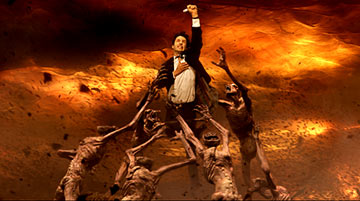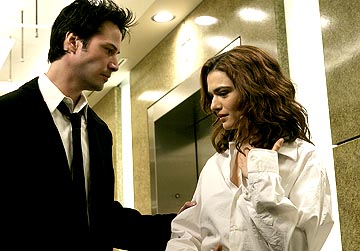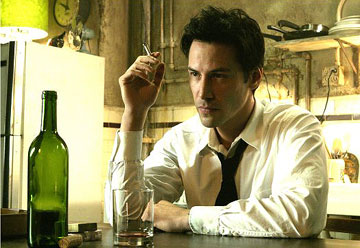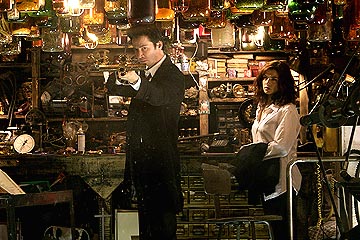
10 Questions with Kevin Brodbin co-writer of CONSTANTINE
March 19th, 2005
Inteview by Chris Wehner

Based on the DC/Vertigo comic book "Hellblazer" and written by Kevin Brodbin, Mark Bomback and Frank Capello, Constantine tells the story of irreverent supernatural detective John Constantine (Keanu Reeves), who has literally been to hell and back. When Constantine teams up with skeptical policewoman Angela Dodson (Rachel Weisz) to solve the mysterious suicide of her twin sister (also played by Weisz), their investigation takes them through the world of demons and angels that exists just beneath the landscape of contemporary Los Angeles. Caught in a catastrophic series of otherworldy events, the two become inextricably involved and seek to find their own peace at whatever cost. In this interview, SU Editor Chris Wehner sits down with co-writer Kevin Brodbin to discuss how he got the project moving, what it's like writing in America (he's from Ireland) and much more.
Being from Ireland how did you get into screenwriting here in the United States?
I worked as a journalist for a newspaper in Ireland, the Sunday Tribune. Then I worked in advertising and publishing. I helped publish a film magazine called “Empire.” I was in London when I first got into Hellblazer, which is the comic book Constantine is based on. I’ve been involved with this from the start.
I came here and sold a couple of specs. The Glimmer Man was the first script I ever wrote. While I was here in the states I wrote Tick-Tock. Then one day I was asked, "What would be your dream project?" And it was Hellblazer. An executive put me in contact with the producers who owned the rights to it and it ended up being the third script I worked on in the states.
With a journalistic background, how did that help you as a writer? The first screenwriters were ex-news reporters.
I started off wanting to be a writer anyway and wasn’t necessarily looking to be a journalist, it just kind of happened. When I was a student I ended up working at the Sunday Tribune. Trying to meet deadlines was a great motivator for me. I liked research and the focus that goes into structuring a news story. That does become relevant with screenwriting. The structural aspects especially, you find a lot of similarities.
So you got involved with Hellblazer. You said that Constantine was one of the most interesting characters you had ever come across.
He’s one of the more reluctant heroes I had ever come across. He’s really kind of an asshole. He doesn’t want to give a shit but he realizes it’s part of his nature. The way I pitched him to the producers was as a kind of rock-n-roll star of the occult. He didn’t do it for religious reasons but almost as an extreme sport. To bedevil the devil, you know. I’ve always seen him as a hero with an evil soul. I originally pitched him as English, no one really knew the comic book. He wasn’t like Batman or X-Men, where part of the deal is that the character already has a fan base. This was the opposite. No one knew about the comic book, especially here. So, as you can imagine, an English character they’ve [the producers] never heard of and a comic book they never heard of, I decided to make him American. As long as his voice worked it wouldn’t matter how his accent worked. What’s interesting is I was a temp worker at Warner Bros. and six months later ended up selling the idea of Hellblazer to the executive I had temped for. He didn’t even remember I had temped for him [laughs].

A comic book that no one has heard of and does not have the built in audience that studios like to have with such a project must have been a big hindrance. He’s also not a sympathetic character. Did making Constantine American alleviate some of that?
No, he was a dark character at first and has become more sympathetic towards the final version. He’s still a dark character. He’s the guy who does an exorcism and takes money for it. I don’t have to sympathize with a character as long as I can understand him. I’m associating American with sympathetic. He uses his cynicism and wit to sort of protect himself; His fears and guilt. Also, I pitched it with the idea that he was this guy who was already dieing and he knows when he dies he’s going to hell. So this is his last chance at redemption.
So do you think because this wasn’t an American comic book character, Constantine was therefore created as a dark anti-hero?
Well, there are dark American comic book characters.
yes, but American comic book characters are becoming darker. They originated in a much different way. Just looking at the fact that they came about forty-plus years ago. They were good guys. We’re making them darker, more complicated, you can see that with Batman and Spider-man, but just looking at the first Superman in the 1980s. That’s what I mean.
Yeah, and I really liked that about Spider-man. By focusing on the character and not the special effects it gives you the chance to sympathize with them. I don’t think the origins of Constantine effected much about his character. His voice obviously was changed from English. Politically he’s very anti-Conservative. You rarely see a comic book character talk about politics. In the film, he’s kind of nihilistic, he expects the worst in people. It’s not overtly politically. With a character like this you have to break him down to his core: for me he’s like James Dean spliced with Humphrey Bogart. He’s not a-moral, but has his own morality. He’s a mouthy, chain-smoking, hard drinking agonist who only reluctantly becomes a hero. He’s a trickster, a con-artist, he’d think nothing of sleeping with an attractive female demon.

As his transformation occurs how do you develop that redemption aspect that he ultimately seeks and yet keep it believable? Especially since he’s clearly an anti-hero.
The studio is not going to put $100 million into a story if it’s depressing, so he’s not going to be that drastic at any point. I think for a story of redemption to work it has to be a real redemption. It’s not like he becomes a totally different person at the end. He’s not gonna stop smoking or drinking, or stop taking on the Devils. But what he does do is make up for some of the things in his past. He kind of takes the first step for making up for his sins. In my version originally, it goes back to the original comic book and what was known as the Newcastle incident. Which is where Constantine performed an exorcism on a young girl. He allowed a demon to come through and she died and her soul was taken to hell. He knows because he lost her soul he is going to hell. In the current version of the script this isn’t referenced, I don’t think. It has more to do with, well, he tried to commit suicide so therefore he’s going to hell.
Why did they make that change?
I don’t know. Maybe because it involved too much backstory. It was very involved in my original script because the female cop, the character I created, Angela, turned out to be that girl. So there was a twist at the end where the person he’s working with turned out to be the soul of the little girl he lost. I think when they made that change, the last third of the script they made a lot, and when they made those changers that was one of the ones they made; maybe it was too confusing, I don’t know.
Are there still some scenes that are right out of the comic book?
Probably not right out of it. But there are many that are inspired by it obviously. One of my favorites, see, in the comic book there was this scene about this fat guy who eats himself to death. The more he eats the thinner he gets until he dies. I created this character, Hennessy, the ex-preist who gets Constantine involved. The story in the film as it exists now. In all the versions of the script, which is very close to the comic book, this guy is wasting away to nothing though he keeps telling us he’s hungry. They changed that now to where he drinks himself to death, which I think was to save money as the special effects for the fat guy wasting away was something like $4 million.
How did you come up with the character of Angela and what is her mechanism within the story, what function does she serve?
She kind of fills two roles. In one she was a way into the story in that she wanted to find out what had happened to a woman who committed suicide. Angela is a path into the story for us. Also, because Constantine inhabits such a strange and dark underworld of demons and angles, we needed fresh air and a kind of audience point of view from which to enter his world. Angela is our eyes into his world. He can use obscure language and she can interpret it for us. What I came up with was a character-based subplot about her. The overall story is about Constantine discovering he’s dieing and that he’s going to hell to pay for his past sins. Then he gets involved with a female detective as they try to stop a devil. In my version it was one of the nine-inch nails that was used to crucify Christ that the Devil’s used to escape. There was another writer [Mark Bomback] between myself and Frank Cappello and he came up with the spear of destiny. Akiva [Goldsman] changed it back. In my version the Devil that was trying to get out of hell, there was three Devils, kind of a reflection of the Catholic notion of three Gods and one God. One of the Devils betrayed the others to walk the earth.

Do you know why the title was changed from Hellblazer?
I was kind of behind that actually. Because I would tell people what I was doing and they would ask, “Oh, really, Hellraiser, which one?” You know. My title was originally: John Constantine: Hellblazer. Which then just became Constantine, and now gets mixed up with the 3rd Century Emperor. [laughs]
What did you think of the film?
I liked it a lot. Francis Lawrence, the director, really keep the integrity of the character. Keanu does a stunning job, he’s really good. I wasn’t sure about the casting at first, but it turned out fantastic.
Any trepidation over Francis Lawrence, he was basically just a music video guy.
I didn’t know much about him at first either. I didn’t meet him until I went down to the set, and he was very gracious. The thing that he did that reassured me, was when he cast Tilda Swinton as the angle Gabriel, I thought she was a brilliant choice.
Sounds like it was overall a decent experience for you, good luck with your future endeavors.
Thank you.
More recent articles in Interviews
Only logged-in members can comment. You can log in or join today for free!
Advertisement






